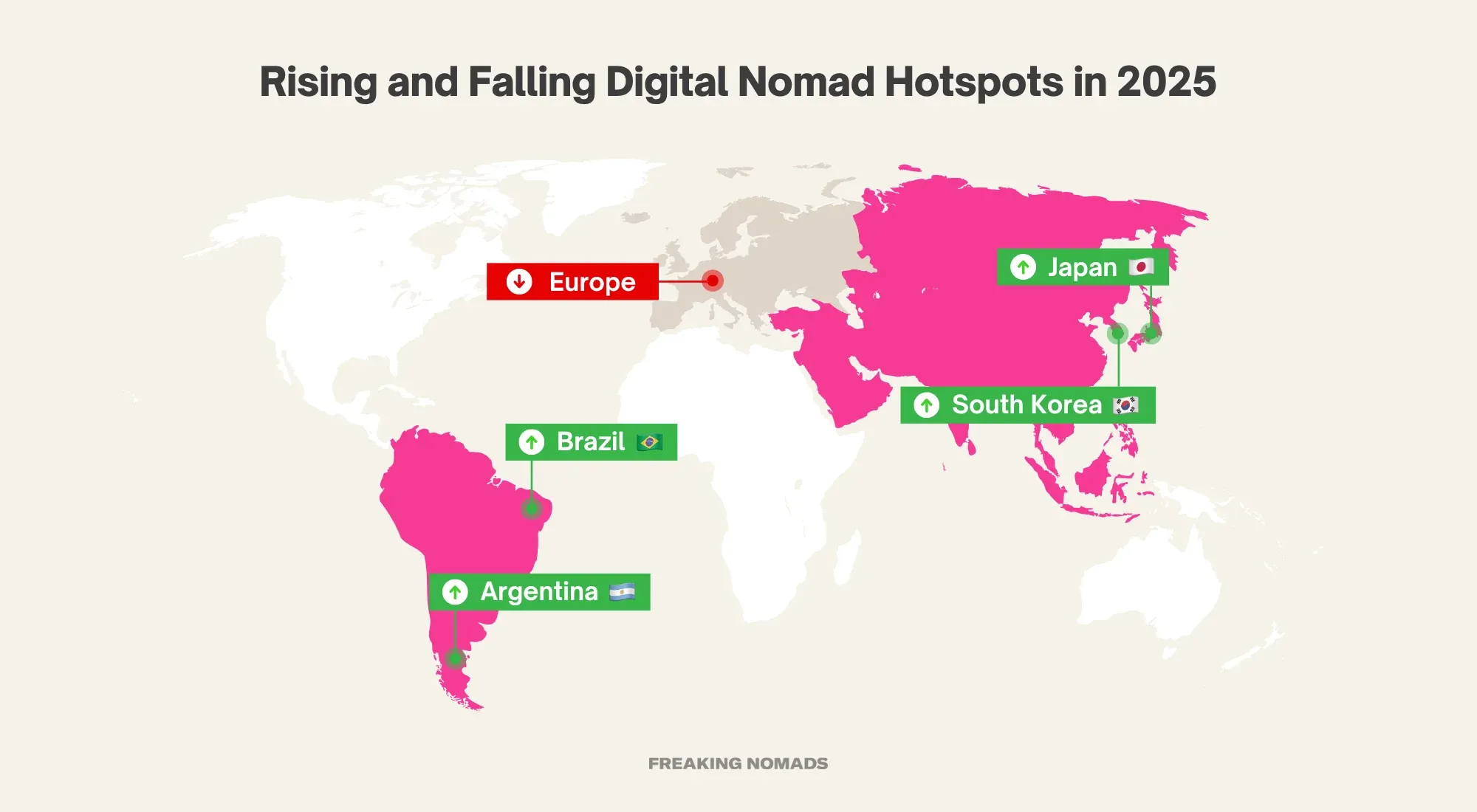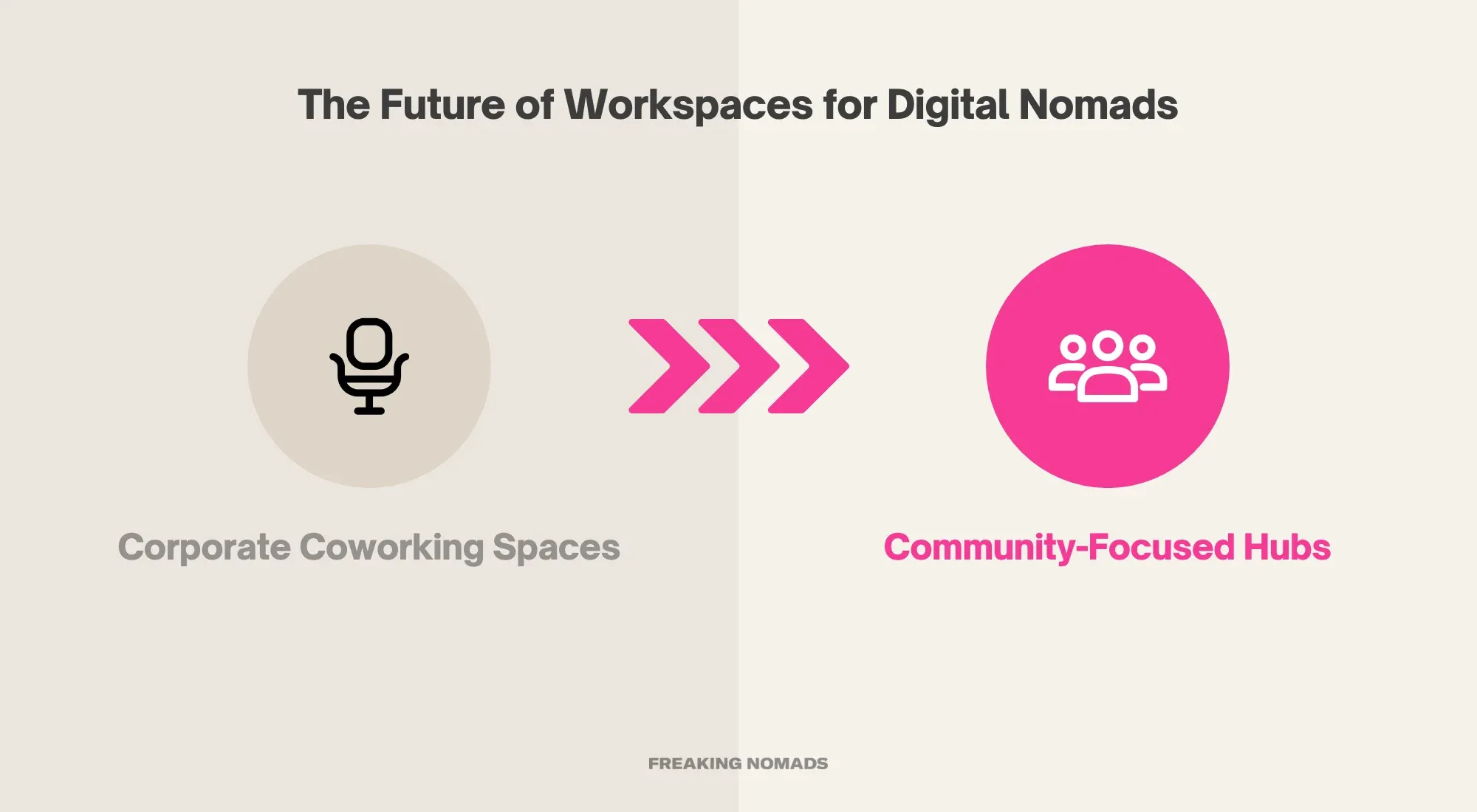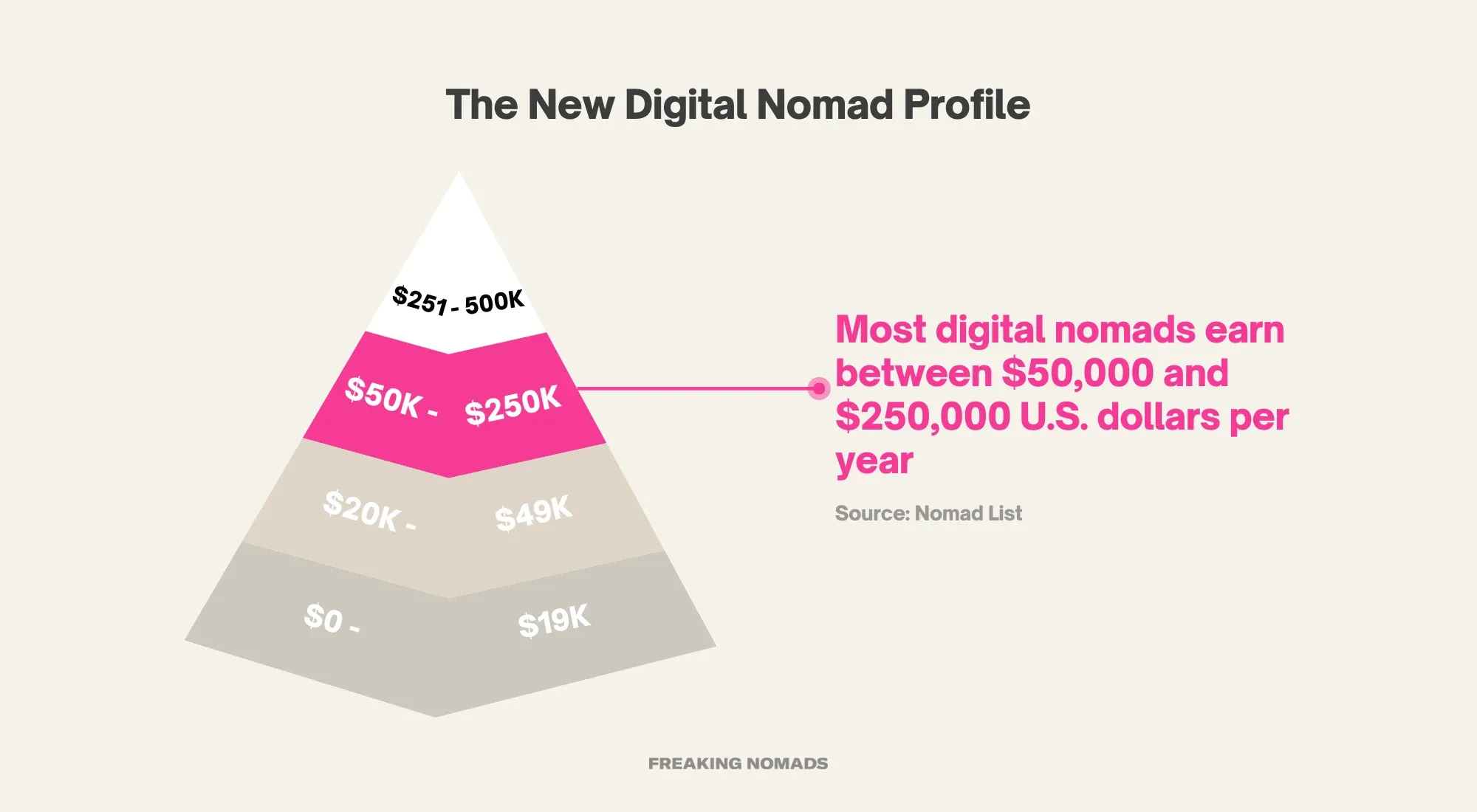Digital Nomad Trends: New Visas, Emerging Hubs & Community Evolution
2025's biggest digital nomad trends: new visa programs in Africa, emerging destinations beyond Europe, evolving community hubs, and rural opportunities.


The digital nomad movement is proving remarkably resilient. Even as corporate giants like Amazon and IBM made headlines with their return-to-office (RTO) mandates, digital nomadism continues to skyrocket in popularity.
These corporate pushbacks seem to actually have had an unexpected effect: inspiring more professionals to seek out location-independent careers rather than return to traditional office life.
As we move into 2026, we're witnessing a groundbreaking year for remote workers globally, with fascinating evolutionary changes in how digital nomads choose to live, work, and seek communities. These changes are expected to reshape entire economies and force governments to rethink their approach to attracting digital nomad talents.
Drawing insights from Gonçalo Hall, founder of NOMADX and a pioneering force in building global digital nomad communities, let's explore the transformative trends that will define the digital nomad lifestyle in 2026.
Trend 1 – New Upcoming Digital Nomad Visas
The landscape of digital nomad visas is expanding rapidly, with several significant new programs reshaping the possibilities for location-independent work. Kenya's Digital Nomad Work Permit was announced by President William Ruto in October 2024 and was set to be launched in 2025. Although it's not clear when it will become effective, this represents Africa's most ambitious attempt yet to attract remote talent.
Another country, South Africa, isn't far behind, announcing a potentially game-changing three-year digital nomad visa program. While still in development, the program is expected to require an annual income of approximately $53,600, targeting high-earning professionals who can contribute significantly to the local economy.
These new programs will join an already robust ecosystem of already established visas, creating unprecedented freedom of movement for qualified digital nomads. However, the higher income requirements of these new programs reflect a growing trend toward attracting more established professionals rather than entry-level remote workers.
Trend 2 – A Geographic Shift and New Rising Digital Nomad Destinations

A dramatic geographical realignment is underway in the digital nomad world: "We see the reduction of digital nomads in Europe, and there's a clear movement towards Asia and South America" observes Gonçalo Hall.
Countries like Japan, Brazil, South Korea, and Argentina are actively courting this remote professional pool with innovative policies and infrastructure developments.
This shift isn't merely about cost arbitrage (though Europe's rising living costs certainly play a part).
Japan's recent opening to digital nomads has created waves in the community, while Brazil's emerging tech hubs in cities like São Paulo and Florianópolis are drawing talent with their unique blend of lifestyle and infrastructure. Similarly, South Korea's startup scene and Argentina's digital nomad-friendly policies are creating compelling alternatives to traditional European destinations.
Trend 3 – The Emergence of New Unexpected Countries
Not only established Asian hubs and new emerging South American economies are looking to attract digital nomads. The map of digital nomad destinations is being redrawn in surprising ways.
"Soon I expect the same in El Salvador, Peru and in 3-5 years many African countries like Mozambique, Kenya, Ghana to become more popular" says Gonçalo.
And each of these emerging destinations could bring unique advantages to the table.
El Salvador
El Salvador is positioning itself as a crypto-friendly haven, with its pioneering "Bitcoin Beach" project already attracting a vibrant community of online professionals. The country's commitment to digital infrastructure and cryptocurrency adoption sets it truly apart in Central America.
Peru
Peru is also emerging as a compelling option, particularly in cities like Cusco and Lima. The combination of historical richness, surf spots, modern amenities, relatively low cost of living, and robust internet infrastructure in major cities creates an attractive package for digital nomads seeking cultural immersion alongside work capabilities.
New African Hubs
In Africa, an exciting transformation is underway:
- Mozambique is capitalizing on its stunning coastline, positioning itself as a beach lifestyle destination while rapidly improving its digital infrastructure
- Kenya's tech hub status, centered around Nairobi's "Silicon Savannah", is drawing increasing attention from the global tech community
- Ghana, particularly its capital Accra, is becoming known for its friendly business environment and growing startup ecosystem.
Trend 4 – The Evolution of Coworking and Coliving Spaces

The infrastructure supporting digital nomads is also experiencing its own revolution. As Gonçalo notes:
"The concept of coworking as a renting a desk business is slowly dying."
Instead, we're seeing a fascinating bifurcation in the market. On one end, there are the WeWork-style corporate spaces with their sleek, professional environments. On the other, community-focused social hubs like The Living Room in Malaga are emerging as vibrant centers of nomadic life.
Perhaps even more intriguing is the evolution of coliving spaces. As Gonçalo shared with us, this new model features mixed-use facilities with 60+ rooms in city centers, exemplified by innovative brands like The Social Hub and Zoku. These spaces aren't just providing beds and desks – they're creating integrated ecosystems where work, life, and community seamlessly blend together.
Trend 5 – The Rural Digital Nomad Revolution
In what might seem counterintuitive to traditional digital nomad patterns, rural areas are emerging as the next frontier for digital nomads.
"Rural communities represent the single biggest opportunity globally" explains Gonçalo, pointing to the success of innovative projects like Avnea in Crete and the Digital Nomad Village he established in Madeira island in 2021.
This isn't just about seeking cheaper alternatives to urban centers – it represents a fundamental shift in what digital nomads value.
The appeal lies in the promise of authentic cultural immersion, stronger community bonds, and a deeper connection to local life. These rural hubs will be redefining what it means to be a digital nomad, moving away from the stereotypical urban cafe-hopping lifestyle to something more rooted and sustainable.
Trend 6 – A Change in How Digital Nomads Are Perceived

The stereotype of the digital nomad as a budget-conscious backpacker is rapidly becoming obsolete.
"We are not backpackers, we do have money but we are price-conscious. Most nomads earn +50,000 euros a year" Gonçalo emphasizes.
And the data confirm his point as, according to Nomads.com, most digital nomads earn between $50,000 and $250,000 U.S. dollars per year, whereas a whopping 37% of digital nomads earn at least $100k/year while happily traveling the world.
This change in perception of the digital nomad demographic is driving significant changes in how destinations and service providers cater to this increasingly sophisticated market and this is expected to continue in 2026.
Trend 7 – The Rise of Structured Community Development
"The future of digital nomadism is being built around structured, intentional community building", according to Gonçalo.
His vision of creating a network of 50 community hubs in 5 years, with events, community managers, coworking spaces and accommodation reflects a broader trend toward creating sustainable, integrated digital nomad communities rather than just temporary gathering spots.
This shift toward structured communities is already showing remarkable results in places like Madeira, where Gonçalo's program has demonstrated the power of well-managed community integration. "What we've seen with Madeira is that nomads have an incredible positive impact in the economy and society when there's a well-managed program that acts as a bridge between the local community, the nomad community and the expat community" he explains.
The success lies in creating meaningful connections that benefit all parties: locals gain economic opportunities and cultural exchange, while nomads find authentic experiences and deeper integration into their chosen destinations.
Trend 8 – Government Integration of Nomad Programs
Perhaps the most significant institutional change though, is happening at the government level.
"I believe that most governments will integrate the digital nomad projects inside their current investment agencies", Gonçalo predicts.
This isn't just about issuing visas but also about "treating digital nomads as valuable contributors to economic development", he explains.
And that's exactly why the government programs that will thrive in 2026 will need to take a more holistic approach, combining community leadership, business partnerships, physical and online hubs, and structured integration strategies.
This represents a recognition that digital nomads aren't just temporary visitors but potential catalysts for local economic growth.
Ready to Hop on the Digital Nomad Trend?
Freaking Nomads will continue to be your go-to source for the latest insights and trends in the digital nomad lifestyle. Stay tuned for more expert interviews and in-depth analyses to help you navigate your nomadic journey.

Join our global
digital nomad community
Join us for free
Freaking Nomads is supported by you. Clicking through our links may earn us a small affiliate commission, and that's what allows us to keep producing free, helpful content. Learn more
Read Next


BNESIM eSIM Honest Review


Pros and Cons of eSIMs for International Travel


